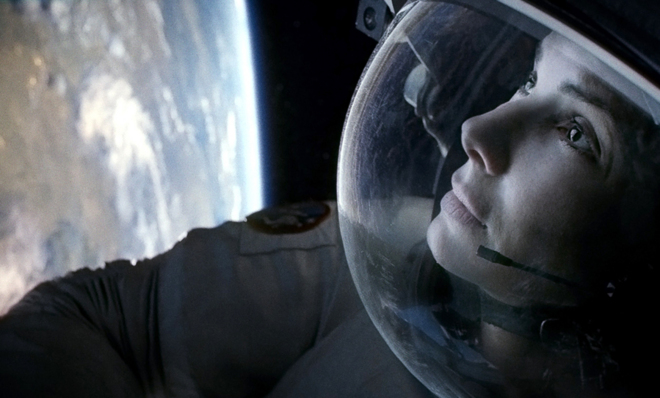5 reasons Gravity is such a smash hit
The outer-space blockbuster exceeded expectations to earn October's highest opening weekend gross ever. But really, we shouldn't be surprised.

A free daily email with the biggest news stories of the day – and the best features from TheWeek.com
You are now subscribed
Your newsletter sign-up was successful
Gravity, Alfonso Cuaron's $100 million space opera, was project to be a winner at the box office over the weekend — but virtually no one predicted just how big a winner it would turn out to be. The film earned a massive $55.7 million domestically, which gives it the highest opening weekend gross for any film ever released in October. It's also the highest opening weekend gross for any film ever released starring Sandra Bullock or George Clooney.
The numbers speak for themselves. But how did Gravity defy its own title and rocket to the top of the box office last weekend? Here, five key factors:
1. Buzz
The Week
Escape your echo chamber. Get the facts behind the news, plus analysis from multiple perspectives.

Sign up for The Week's Free Newsletters
From our morning news briefing to a weekly Good News Newsletter, get the best of The Week delivered directly to your inbox.
From our morning news briefing to a weekly Good News Newsletter, get the best of The Week delivered directly to your inbox.
The promotional campaign for Gravity was nothing short of a master class on how to successfully market a movie. The jaw-dropping teaser trailers grabbed the attention of both critics and cinema-goers, and Gravity's presence on the festival circuit helped it strike a fine balance between critical and commercial acclaim. When you mix in the gravitas of its Oscar-winning actors, and the earnestness of a director who refused to compromise his distinctive vision, you've got a blockbuster that's built more buzz than any film in months.
2. IMAX and 3D
Many have argued that there hasn't been a true "event movie," from a technical perspective, since Avatar — but Gravity has certainly filled that gap. (Even Avatar director James Cameron described it as "the best space film ever done.") Much of the buzz that preceded Gravity's release focused on its technical achievements, marking its card as a movie that had to be watched in 3D and on the biggest screen possible — both of which meant that the full Gravity experience cost more than the average movie ticket. It's no surprise that the movie earned $11.2 million of its take from IMAX venues alone, which sets another October record, or that 3D tickets accounted for almost 80 percent of its total ticket sales. Those figures helped inflate Gravity's haul — but they also proved, despite reports about the death of 3D, that audiences still have an appetite for the additional dimension if they believe it will truly enhance their experience.
3. Originality
A free daily email with the biggest news stories of the day – and the best features from TheWeek.com
With the exception of occasional bright spots like Inception, it's been a bad few years for original blockbusters — and 2013 might be the worst yet. The spring and summer schedule was crammed full of sequels (Iron Man 3, Despicable Me 2, Fast and Furious 6); prequels (Monsters University, Oz the Great and Powerful); spin-offs (The Wolverine); reboots (Man of Steel); and adaptations (The Great Gatsby, World War Z). After so much of the old, audiences were clearly ready to see something new.
4. The resurgence of sci-fi
After something of a break from the box office, science fiction is back in a big way in 2013. The year has already brought the skin-tight spacesuits of Star Trek Into Darkness, the socially conscious allegory of Elysium, and the upcoming Ender's Game — but Gravity's fearless (and terrifying) commitment to deep-space action pegged it as this year's sci-fi movie to beat.
5. It's simply a great movie
All the factors above played a major part in Gravity's success, but the simplest answer may be the most accurate of all: Gravity is a really, really great movie. The 98 percent fresh rating that Gravity holds on Rotten Tomatoes is indicative of the universal acclaim it has received, and the A- CinemaScore shows that moviegoers are just as pleased. And its appeal extended far beyond the male, teenage audience that tends to fuel the big blockbusters. Gravity attracted a much broader fanbase: A cross-section of cinema-goers that was 46 percent female and 59 percent over the age of 35, which ensured that Cuaron's flick could tap into markets that Hollywood all too often fails to engage. As the studios scramble to take in the lessons of Gravity's massive success, let's hope they learn the simplest one: Make great movies that can only be truly experienced in theaters, and audiences will pay for them.

Daniel is a freelance writer, an Englishman abroad, and a pop culture junkie. He writes about film, TV, and lifestyle for outlets including MSN, The Guardian, The Times, The Independent, The Evening Standard, and Yahoo.